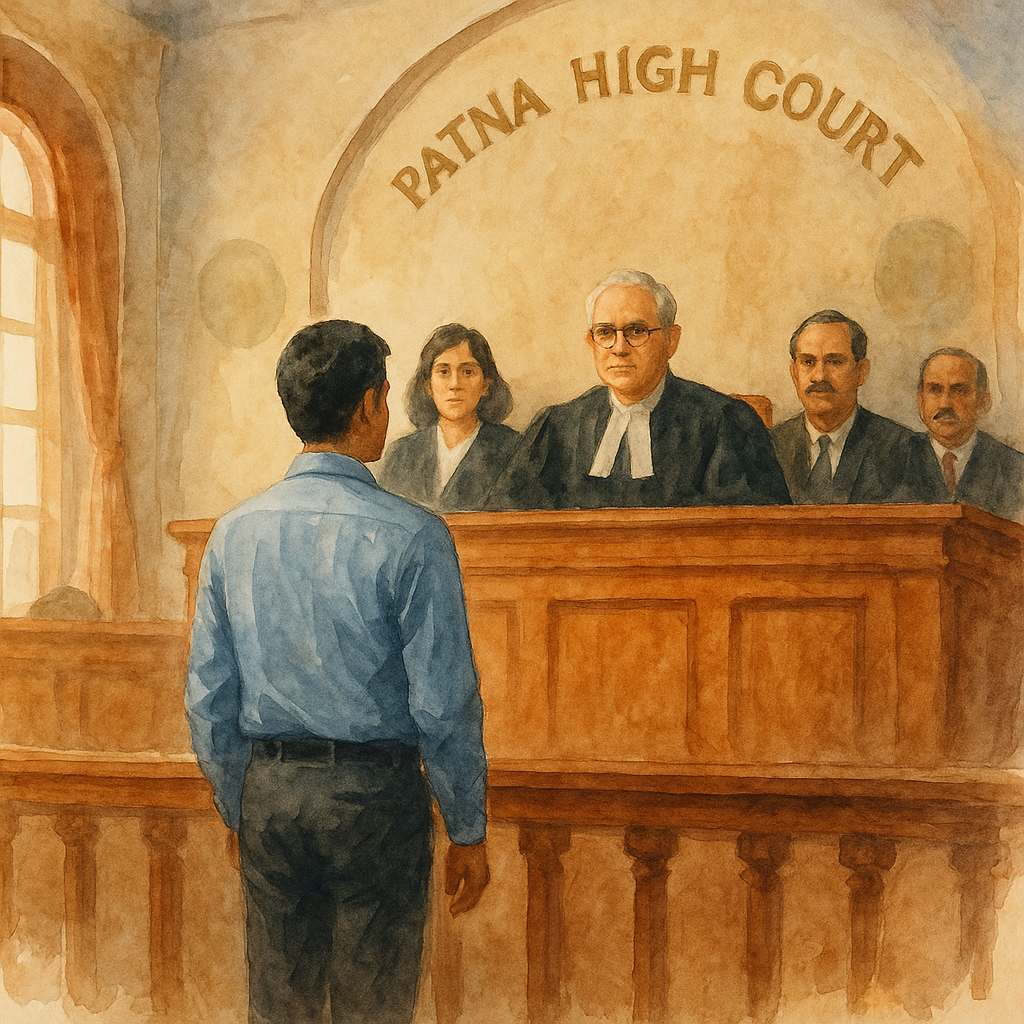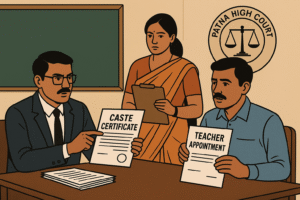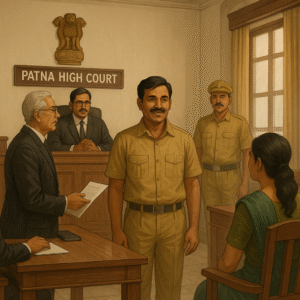Simplified Explanation of the Judgment
The Patna High Court in Civil Writ Jurisdiction Case No. 14816 of 2015, decided on 22 June 2021, delivered a significant judgment concerning the misuse of compulsory retirement provisions under the Bihar State Electricity Board Service Regulations, 1976.
The case involved a senior officer of the Bihar State Power Holding Company Limited (BSPHCL), who was compulsorily retired from service in 2013 without completion of any departmental inquiry. The Court held that such compulsory retirement, passed without proper inquiry or reasoning, violates natural justice and is unsustainable in law.
Background of the Case
The petitioner, an officer serving in the South Bihar Power Distribution Company (a subsidiary of BSPHCL), was issued a show-cause notice on 29 March 2013 for alleged dereliction of duty related to power distribution inefficiencies. Shortly after, he was suspended on 4 April 2013 under charges of misconduct and inefficiency.
However, without completing the inquiry into those charges, the company compulsorily retired him on 31 July 2013 under Section 74(a) of the Bihar State Electricity Board Service Regulations, 1976, claiming that his continuance in service was not in public interest. The authorities gave him three months’ salary in advance as per the rule.
The petitioner appealed, but the Appellate Authority merely issued a “second show-cause notice” and then upheld the retirement order.
He approached the Patna High Court contending that:
- No departmental inquiry was conducted, despite the suspension and charge memo.
- The so-called compulsory retirement was in reality a punitive action disguised as a retirement in “public interest.”
- His right to a fair hearing was violated.
Arguments
Petitioner’s Counsel:
- The compulsory retirement was used as a tool to terminate him without due process.
- Since a formal inquiry was pending, the company could not resort to compulsory retirement before establishing guilt.
- Section 74(a) permits retirement in public interest only for non-performing employees, not as a substitute for disciplinary proceedings.
Respondent’s Counsel:
- The retirement was not punitive but in public interest.
- The appellate authority had provided a show-cause notice before confirming the order, ensuring compliance with natural justice.
- The petitioner was allegedly a “deadwood” employee, hence retired under administrative discretion.
Court’s Findings and Reasoning
The Hon’ble Mr. Justice Anil Kumar Upadhyay rejected the company’s justification and observed that the authorities had completely misapplied the concept of compulsory retirement.
Key findings:
- No Inquiry Held:
- The petitioner was suspended and charged, but no inquiry was held.
- Compulsory retirement without determining the truth of the allegations amounts to arbitrary action.
- Natural Justice Violated:
- The “second show-cause notice” issued by the appellate authority could not substitute a departmental inquiry.
- Such post-facto attempts to justify an illegal decision are contrary to the principles of natural justice.
- Misuse of Public Interest Clause:
- The Court stated that public interest retirement cannot be used as a tool to punish an employee when disciplinary proceedings were pending.
- Legal Effect:
- The so-called “public interest” reason was a façade to bypass the requirement of inquiry.
- Therefore, the decision suffered from non-application of mind and was contrary to law.
Decision and Directions
The High Court allowed the writ petition, quashed the compulsory retirement order, and directed full restoration of service benefits.
Specifically, the Court ordered:
- The petitioner shall be treated as in continuous service until his date of superannuation (January 2021).
- All consequential benefits, including salary, pension, and increments, must be paid after adjusting any amount already received.
- If payment is delayed beyond three months from the receipt of the judgment, the petitioner shall be entitled to 9% interest per annum from the date of filing the writ petition until full payment.
Thus, the Court reaffirmed that an employee cannot be forcibly retired under the guise of “public interest” without following due process or departmental procedure.
Significance or Implication of the Judgment
This decision reinforces the protection of service rights of government and public sector employees, highlighting the following principles:
- Compulsory retirement is not punishment, but cannot replace disciplinary inquiry.
Authorities must not use it as a shortcut to avoid due process. - Natural justice is non-negotiable:
Even administrative decisions affecting employment must follow fairness, reasoning, and opportunity to respond. - Public interest must be genuine:
Retirement in “public interest” can be invoked only for truly non-performing employees, not as a pretext for disciplinary action. - Remedial compensation:
The Court’s direction for full restoration and interest emphasizes accountability for unlawful administrative actions.
This ruling serves as a strong precedent against arbitrary use of compulsory retirement powers in Bihar’s public sector undertakings.
Legal Issues Decided and the Court’s Decision
- Whether an employee can be compulsorily retired without completing departmental inquiry?
- Decision: No. Such retirement is illegal and contrary to natural justice.
- Whether a “second show-cause” during appeal can cure the original defect?
- Decision: No. It cannot substitute the requirement of a proper departmental proceeding.
- Whether compulsory retirement in “public interest” can be invoked when charges of misconduct are pending?
- Decision: No. The power cannot be misused to avoid inquiry.
- Relief:
The petitioner reinstated notionally till retirement and entitled to all benefits with 9% interest if delayed.
Judgments Relied Upon or Cited by the Court
No specific external citations recorded, but the reasoning aligns with:
- Baikuntha Nath Das v. Chief District Medical Officer, (1992) 2 SCC 299
- Union of India v. Col. J.N. Sinha, (1970) 2 SCC 458
Case Title
Rajendra Prasad v. Bihar State Power Holding Company Limited & Ors.
Case Number
Civil Writ Jurisdiction Case No. 14816 of 2015
Citation(s)
2021(3) PLJR 5
Coram and Names of Judges
Hon’ble Mr. Justice Anil Kumar Upadhyay
Names of Advocates and who they appeared for
- For the Petitioner: Mr. Bajarangi Lal, Advocate
- For the Respondents: Mr. Vinay Kirti Singh, Senior Advocate
Link to Judgment
MTUjMTQ4MTYjMjAxNSMxI04=-SYeFL2mUT0M=
If you found this explanation helpful and wish to stay informed about how legal developments may affect your rights in Bihar, you may consider following Samvida Law Associates for more updates.








